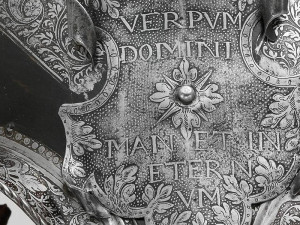by Rev. A. Brian Flamme
 In these blog articles we’ve been learning that the Reformation wasn’t so much about men, nor was it brought about by their will and power. The Reformation was about Christ and it came by the pure preaching of His Word. This Word gives peace. We hear that our warfare with God is over and that the iniquity of our sins is pardoned for Jesus’ sake (Isaiah 40:2; John 20:19).
In these blog articles we’ve been learning that the Reformation wasn’t so much about men, nor was it brought about by their will and power. The Reformation was about Christ and it came by the pure preaching of His Word. This Word gives peace. We hear that our warfare with God is over and that the iniquity of our sins is pardoned for Jesus’ sake (Isaiah 40:2; John 20:19).
This Gospel is easy to assert when times are good, but that changes when you’re isolated and threatened by angry theologians, war, and imprisonment. What are we supposed to do when Christ’s peace is in conflict with being at peace with the pope, emperor, philosophers, and radical reformers? Can you have both kinds of peace? Should one be sacrificed for the other?
When Philipp Melanchthon spoke on Luther’s death in 1546, he said about himself and his fellow Lutherans, “We resemble orphans bereft of an excellent and faithful father.”[1] Why the image of orphans? It felt like they were left to fend for themselves. Bente writes, “As long as that hero of faith and prayer was still living, the weight of his personal influence and authority proved to be a veritable bulwark of peace and doctrinal purity against the enemies within as well as without the Church.”[2] Now that Luther the “bulwark” was gone, the enemies charged, and it fell to Melanchthon to hold the gap.
Who was Philipp Melanchthon? How did he find himself in this position? He was a humanist and a theologian who had been fighting for the truth of the Gospel alongside Luther for decades.[3] He was born in 1497 and after his father died at the age of 11 he began his education at the Latin school in Pforzheim where he became close to his granduncle, the humanist scholar John Reuchlin.[4] Later at the Universities of Heidelberg and Tubingen he poured himself into studying the languages of Latin and Greek and became an expert in the ancient classical works. Eventually he took a teaching post at the University of Wittenberg and came under Luther’s direct theological influence. He could see the truth and sense of what Luther preached. He could see his conviction for the Gospel confirmed in the Holy Scriptures. In no time he became invaluable to the evangelical cause and wrote works such as his Theological Commonplaces, a Commentary on Romans, the Augsburg Confession, the Apology of the Augsburg Confession, and the Treatise on the Power and Primacy of the Pope. These works are still used to teach Lutheran theologians because of their clarity and commitment to the pure doctrine of Holy Scripture.
It seems that as long as Luther was around, Melanchthon had a friend, mentor, and pastor that understood and spoke against his temptations toward fear of the world and love of philosophy. But that changed after Luther died. The attacks became too much to bear. Often we consider attacks upon the Gospel as merely verbal or argumentative, but Melanchthon had to deal with the swords and spears of the Emperor’s armies in league with the Pope on a mission to extinguish the upstart evangelical churches once and for all. The resulting Smalcald War ended in a crushing defeat for the Lutherans (April 24, 1547). Until all the subdued lands and princes could be purged of evangelical doctrine, the Augsburg Interim (May 15, 1548) was written and enacted by the emperor. It was a kind of mediating document which made concessions on communion with both kinds and pastors having wives, but ultimately demanded rejection of sola fide and confused justification with renewal, thereby sullying the glory and comfort of Christ. Soon after Melanchthon was commissioned to write a better compromising document, the Leipzig Interim (December 18, 1548), but even if it sounded more evangelical than the Augsburg Interim, there were enough concessions on justification and ceremonies that it was roundly condemned by the other Lutherans.
Long story short, the Evangelicals looked to Philipp for guidance and stability amidst the coming onslaught, but his efforts fell short. The reformation church broke apart and Philipp fell out of favor because of his compromises with the Papists and Reformed on matters of ceremonies, Christ’s presence in the Supper, and the role of human will in conversion. With regard to the compromises with the Papists specifically, Bente writes, “The plan of Melanchthon therefore was to yield in things which he regarded as unnecessary in order to maintain the truth and avoid persecution.”[5] Sadly, his sincere efforts at peace and compromise on matters that he considered insignificant ended up compromising the central truth for which he and Luther had fought. The price of peace with the world by waffling on the central article of faith, justification by grace through faith, also meant uncertainty regarding peace with God the Father in heaven.
From the perspective of the world, Melanchthon is easily vindicated for siding with peace instead of faithfulness to pure doctrine. And when the world threatens prison, persecution, and death for not siding with them, who thinks that they have it within themselves to withstand these kinds of attacks?
 Our strength is not found in ourselves, it’s found in God who alone gives steadfastness of faith that endures to the end (1 Peter 5:10). In the same way, the cause of the Reformation never belonged to Luther, Melanchthon, or any theologian. It belongs to Christ and He has already won the victory over sin and death (1 Corinthians 15:57). Our peace with the Father is secure for Christ’s sake. The world has been overcome (John 16:33). The hope of resurrection remains even if it seems like everything else is lost (2 Corinthians 4:8-9).
Our strength is not found in ourselves, it’s found in God who alone gives steadfastness of faith that endures to the end (1 Peter 5:10). In the same way, the cause of the Reformation never belonged to Luther, Melanchthon, or any theologian. It belongs to Christ and He has already won the victory over sin and death (1 Corinthians 15:57). Our peace with the Father is secure for Christ’s sake. The world has been overcome (John 16:33). The hope of resurrection remains even if it seems like everything else is lost (2 Corinthians 4:8-9).
We should never forget Melanchthon’s greatest contributions. Indeed, I think that the Apology’s treatment of Justification (Article IV) will remain one of the finest and most comforting expositions of Christian doctrine that will last, hopefully, till our Lord returns in glory. Nevertheless, Philipp’s life serves as a warning against making peace with the world at the expense of the truth of what Christ has obtained. Therefore, it’s fitting that I leave you with Luther’s words written to Melanchthon in 1530 to encourage him against compromising with Gospel’s adversaries:
“I pray for you very earnestly, and I am deeply pained that you keep sucking up cares like a leech and thus rendering my prayers vain. Christ knows whether it comes from stupidity or the Spirit, but I for my part am not very much troubled about our cause. Indeed, I am more hopeful than I expected to be. God, who is able to raise the dead, is also able to uphold his cause when it is falling, or to raise it up again when it has fallen, or to move it forward when it is standing. If we are not worthy instruments to accomplish his purpose, he will find others. If we are not strengthened by his promises, where in all the world are the people to whom these promises apply?”[6]
The promises apply to you dear Christians. Even if you’re crushed and disheartened under the attacks of the devil, world, and flesh, Christ remains faithful to his Word so that you would have steadfast faith and hope.
The Rev. A. Brian Flamme is a pastor at Hope Lutheran Church, Aurora, CO.
[1] http://www.bartleby.com/268/7/9.html
[2] Gerhard Bente, “Historical Introductions to the Symbolical Books of the Evangelical Lutheran Church,” Concordia Triglotta (Saint Louis: Concordia Publishing House, 1921), 93.
[3] The humanists during that time were nothing like the groups that call themselves “humanists” today. Before and during the reformation they were closely associated with the Renaissance. They worked at mastery of the classical languages of Latin, Hebrew, and Greek, and reengagement with the ancient written works of Greek and Roman civilizations. Luther and Melanchthon’s commitment to the ancient sources of Scripture and the Church are a direct result of humanist influences.
[4] Christian Preus, “Introduction,” Commonplaces: Loci Communes 1521 by Philip Melanchthon and translated by Christian Preus (Saint Louis: Concordia Publishing House, 2014), 4. See also, Timothy Wengert, “Philip Melanchthon: Speaking for the Reformation,” The Expository Times 126, no. 7 (2015): 313-325.
[5] Ibid, 99
[6] Martin Luther, Luther: Letters of Spiritual Care, Edited and Translated by Theodore G. Tapppert (Vancouver: Regent College Publishing, 1955), 147.
